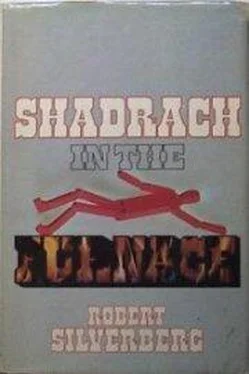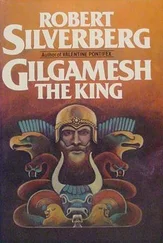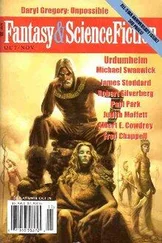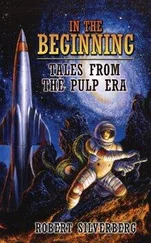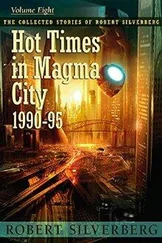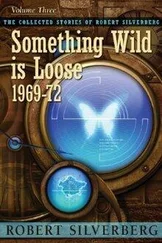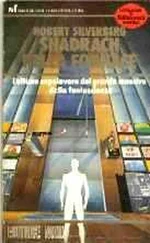“Redundancy,” Chairman Genghis Mao has declared, “is our main avenue of survival.” Mordecai agrees. The intricate business of crossing these interfaces is a trifle to him, part of the normal order of the universe, no more bothersome than the need to turn a key in a lock. The room just on the far side of Interface Three is a cavernous sphere known as Surveillance Vector One. It is, in a literal sense, Genghis Mao’s window on the world. Here a dazzling array of screens, each five square meters in area, rises in overwhelming tiers from floor to ceiling, offering a constantly shifting panorama of televised images relayed from thousands of spy-eyes everywhere on the planet. No great public building is without its secret eyes; scanners look down on all major streets; a corps of government engineers is constantly employed in shifting the cameras from place to place and in installing new ones in previously unspied-upon places. Nor are all the eyes in fixed positions. So many spy-satellites streak through the nearer reaches of space that if their orbits were turned to silk they would swathe the earth in a dense cocoon. At the center of Surveillance Vector One is a grand control panel by means of which the Khan, sitting for hours at a time in an elegant thronelike seat, is able to control the flow of data from all these eyes, calling in signals with quick flutters of his fingertips so that he may look at will into the doings of Tokyo and Bangkok, New York and Moscow, Buenos Aires and Cairo. So sharp is the resolution of the Khan’s myriad lenses that they can show Genghis Mao the color of a man’s eyes at a distance of five kilometers.
When the Chairman is not making use of Surveillance Vector One, the hundreds of screens continue to function without interruption as the master mechanism sucks in data randomly from the innumerable pickup points. Images come and go, sometimes flitting across a screen in a second or two, sometimes lingering to provide consecutive sequences many minutes in length. Shadrach Mordecai, since he must pass through this room every morning on his way to his master, has formed the habit of pausing for a few minutes to watch the gaudy, dizzying stream of pictures. Privately he refers to this daily interlude as “Checking the Trauma Ward,” the Trauma Ward being Mordecai’s secret name for the world in general, that great vale of sorrow and bodily corruption.
He stands in mid-room now, observing the world’s griefs.
The flow is jerkier than usual today; whatever giant computer operates this system is in a twitchy mood, it seems, its commands moving restlessly from eye to eye, and pictures wink on and off in a frenzied way. Still, there are isolated flashes of clarity. A limping woebegone dog moves slowly down a dirt-choked street. A big-eyed, big-bellied Negroid child stands naked in a dust-swept ravine, gnawing her thumb and crying. A sag-shouldered old woman, carrying carefully wrapped bundles through the cobbled plaza of some mellow European city, gasps and clutches at her chest, letting her packages tumble as she falls. A parched Oriental-faced man with wispy white beard and tiny green skullcap emerges from a shop, coughs, and spits blood. A crowd — Mexicans? Japanese? — gathers around two boys dueling with carving knives; their arms and chests are bright with red cuts. Three children huddle on the roof of a torn-away house rushing swiftly downstream on the white-flecked gray breast of a flooding river. A hawk-faced beggar stretches forth an accusing clawlike hand. A young dark-haired woman kneels at a curb, bowed double in pain, head touching the pavement, while two small boys look on. A speeding automobile veers crazily from a highway and vanishes in a bushy gulley. Surveillance Vector One is like some vast tapestry of hundreds of compartments, each with a story to tell, a fragmentary story, tantalizing, defying comprehension. Out there in the world, out in the great big wide Trauma Ward that is the world, the two billion subjects of Genghis II Mao IV Khan are dying hour by hour, despite the best efforts of the Permanent Revolutionary Committee. Nothing new about that — everyone who has ever lived has died hour by hour all through his life — but the modes of death are different in these years following the Virus War; death seems ever so much more immediate when so many people are so conspicuously rotting within all at once; and the general decay out there is that much more poignant because there are these innumerable eyes to see it in its totality. The scanners of the Khan capture everything, making no comment, offering no judgment, merely filling these walls with a staggering, baffling portrait of the revised postwar early-twenty-first-century version of the human condition.
The room is a touchstone of character, drawing revealing responses from every viewer. To Mordecai the whirling stream of scenes is fascinating and repelling, a crazy mosaic of decomposition and defeat, courage and endurance; he loves and pities the sufferers who flash so quickly across the screens, and if he could he would embrace them all — lift that old woman to her feet, put coins in the beggar’s gnarled hand, stroke that child’s distended belly. But Mordecai is, by inclination and profession, a healer. To others the brutal theater that is Surveillance Vector One serves only as a reminder of their own good fortune: how wise of them it was to attain high governmental rank and steady supplies of the Roncevic Antidote, to enjoy the favor of Chairman Genghis Mao and live free of pain and hunger and organ-rot, insulated from the nightmare of real life! To others the screens are unbearable, arousing not a sense of smug superiority but rather a feeling of intolerable guilt that they should be here, safe, while they are out there. And to others the screens are merely boring: they show dramas without plot, transactions without discernible purpose, tragedies without moral significance, mere stray snatches of life’s scratchy fabric. What Genghis Mao’s own reactions to Surveillance Vector One may be is impossible to determine, for the Khan is, in this as in so many other things, wholly inscrutable as he manipulates the controls. But he does spend hours in there. Somehow the room feeds him. Shadrach Mordecai takes his time this morning, giving the huge room five minutes, eight, ten. Genghis Mao still sleeps, after all. The implanted monitors tell Mordecai that. In this world no one escapes surveillance; while the many eyes of Genghis Mao scan the globe, the slumbering Khan is himself scanned by his physician. Mordecai, standing quite motionless beside the Chairman’s upholstered throne, receives a flood of data within and without, Genghis Mao’s metabolic output twanging and tweaking the doctor’s implants, the flowing shimmer of the screens assailing his eyes. He starts to leave, but just then a screen high up and to his left shows him a glimpse of what is certainly Philadelphia, unmistakably Philadelphia, and he halts, riveted. His native city: he was a Bicentennial baby, entering the world in Ben Franklin’s own town, coming forth high up in Hahnemann Hospital when the United States of America was four months short of its two hundredth birthday. And there is Philadelphia now, turning in the gyre of some ineffably keen satellite-mounted eye; the familiar childhood totems, City Hall, Independence Hall, Penn Center, Christ Church. It is years since he last was there. For a decade now, Shadrach Mordecai has lived in Mongolia. Once it was hard for him to believe that there really was such a place as Mongolia, fabled land of Prester John and Genghis Khan, but by this time it is Philadelphia that has started to seem a place of fable to him. And the United States of America? Do those syllables still have meaning? Who could imagine that the Constitution of Jefferson and Madison would be forgotten, and America pledge allegiance to a Mongol overlord? But that overstates the case: America, Mordecai knows, is governed like all other nations by a local wing of the Permanent Revolutionary Committee, that alliance of radical and reactionary groups functioning through a series of vestigial quasi-democratic institutions; and the aged recluse Genghis Mao is merely the Chairman of the Committee, a remote and semimythical figure who governs indirectly and has no immediate consequence in the daily lives of Dr. Mordecai’s former countrymen. Probably no one in America pauses to consider Genghis Mao the embodiment of the authority of the Permanent Revolutionary Committee, and thus the true master of the body politic, any more than one considers the chairman of the board of the local electric company to be the source and controller of the power that flows when the switch is thrown. But he is. Not that many Americans would be disturbed to learn that they owed fealty to a Mongol. The whole world has abdicated; the game of politics is ended; Genghis Mao rules by default, rules because no one cares, because in an exhausted, shattered world dying of organ-rot, there is general relief that someone, anyone, is willing to play the role of global dictator.
Читать дальше
